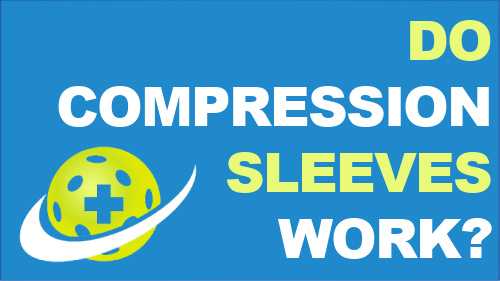Finding ways to improve performance and recovery can be a never-ending quest. If you’re an athlete, you know how important it is to stay on top of your game. If you’re an aging athlete like me, you know your brain still thinks it’s young, but your body doesn’t quite move or recover as quickly as it did. But you may have heard conflicting stories about whether compression sleeves actually help. You may have heard they are just a gimmick or a placebo effect. You see athletes using them on a variety of sports, and definitely on the pickleball court. While they look like a good idea on the surface, it’s important to understand why and whether you should invest in them. Many athletes are wondering, “do compression sleeves work?” Can they help with athletic performance and recovery? In this blog post, we’ll take a look at the evidence and find out if compression sleeves really hold up to their claims of providing performance and recovery benefits.
Introduction
Compression sleeves are popular among athletes and trainers alike as a promising tool to enhance performance and reduce recovery times. Just to be clear, we’re talking about the ones you wear while exercising, not the pneumatic sleeves you wear after. There are several theories on why they work, but what do the experts have to say? Recent research studies have examined the effectiveness of compression sleeves on athletic performance and recovery.
The results of the studies are honestly mixed. It appears that compression sleeves may improve certain aspects of performance in certain sports, such as running and cycling. However, there is less evidence to suggest that they are effective for improving performance in other activities, such as strength training. With respect to recovery, some studies show that compression sleeves may reduce post-exercise soreness and fatigue, while other studies suggest they have no effect. Ultimately, it appears that compression sleeves may be beneficial for some athletes, depending on the sport or activity.
How Do Compression Sleeves Work?
Compression sleeves are a popular choice for athletes looking to improve their performance and recovery. Compression sleeves work by gently squeezing the area of the body that it covers, creating pressure that increases blood circulation and reduces swelling. This localized support helps to alleviate muscle fatigue and reduce the risk of injury.
Compression sleeves are generally made of stretchy, breathable material and are designed to fit snugly. The pressure from the sleeves is typically consistent, providing uniform pressure and a secure fit. Compression sleeves can also help reduce lactic acid buildup, improve muscle recovery, and reduce inflammation and soreness after physical activity.
What Evidence Is There to Support the Use of Compression Sleeves?
Compression sleeves are becoming increasingly popular among athletes, but how effective are they really?
First off, the question of “Do compression sleeves work?” is by itself incomplete. It’s the most searched phrase, but it lacks any specificity. The question to that question is, “At what?” Do compression sleeves work… at improving athletic performance? Not really. Do compression sleeves work… at reducing pain or discomfort? Yes. Do compression sleeves work… at improving recovery? The results are mixed.
In addition, there’s the question of where or which type of sleeve are we talking about? Full leg? Shorts? Stockings? Knee braces? Elbow braces? Upper body? Full body? The overwhelming majority of research on compression sleeves has been done on full leg, followed by stockings. This study provides some great graphics for deeper understanding.
Unfortunately for pickleballers who experience a majority of wear and tear on their knees, the studies are just not out there… yet. However, there is a lot of anecdotal evidence as to the effectiveness of knee sleeves.
In addition to improved athletic performance, compression sleeves are also thought to help with muscle recovery. Recent studies have shown that wearing compression sleeves can reduce muscle soreness and enhance post-exercise recovery. The tight-fitting sleeves provide support to the muscles and can potentially reduce muscle fatigue and soreness in the short and long-term.
Who Benefits Most From Wearing Compression Sleeves?
Compression sleeves appear to be most beneficial for athletes that have a history of injury to a joint/area and are looking for increased support to that area. According to the largest meta-analyses of current research, athletes looking for a competitive edge in power or speed will likely not benefit from compression sleeves, but athletes looking for increased endurance may find that compression sleeves delay onset of fatigue.
Tips for Choosing the Right Compression Sleeve
When considering purchasing a compression sleeve, there are a few key factors to consider for selecting the right type for your needs. First, the fit should be snug but comfortable, as too loose or too tight sleeve can cause more harm than good. Compression sleeves can vary in compression level, allowing you to find the right level of support for your body. It is also important to consider the material and design of the sleeve, as some materials can provide more comfort and breathability. One sleeve I like is the “Go Sleeve” because of its triple combination of factors to really help it stay in place. You can learn more about it here for the knee and here for the elbow.
Takeaway
The research conducted in this blog post concluded that compression sleeves may have a positive effect on improving athletic performance and recovery. What I really found was that more research is needed on physical activity that more closely resembles the movements found in pickleball. As pickleball – and pickleball injuries – grow, there will hopefully be an increase in research focus.
I think the best way to think about compression sleeves is more like protection from injury, rather than a performance enhancing asset. If you feel more confident in your movement with a sleeve on, that’s half the battle, because you will move more freely as a result.
Play on!

